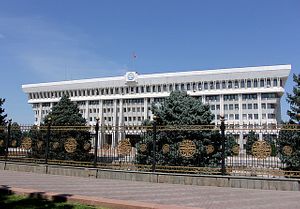Intending to fly to New York to attend the United Nations General Assembly, Kyrgyzstan’s President Almazbek Atambayev suffered unspecified heart problems en route and spent most of the week in Turkey. Friday, officials said he had flown to Moscow for further treatment.
Atambayev left Kyrgyzstan on September 19 on his way to New York. En route, Atambayev experienced unspecified “heart problems.” Turkish media captured video of Atambayev being wheeled out of the airport on a stretcher. EurasiaNet, citing Turkish media, reported that Atambayev was first taken to an airport hotel in an ambulance, then returned to the airport and flown to Izmir on the Aegean Sea.
The presidential press service said, “According to the preliminary conclusion of doctors, Atambayev had symptoms of heart problems. The president will undergo a medical examination and will be under the supervision of doctors for some time.”
Some Turkish sources, like the Haberler news portal, reported that after arriving in Izmir, Atambayev stayed at the Sheraton in Cesme, a resort town west of Izmir. Authorities said Atambayev would be on leave until October 1.
On September 23, Atambayev arrived in Moscow. He was apparently taken to the Central Clinical Hospital of the Presidential Administration of the Russian Federation, known in short as the Kremlin Hospital. It’s not clear what kind of treatment he is undergoing or how long he’ll be in Moscow.
In the meantime, the classic Central Asian rumor mill churns. Of particular interest was Atambayev’s detour to Izmir and just who was paying for the resort. According to Kloop, the president’s office said that the hotel in Turkey, which they would not specify, was paid for by Atambayev himself as he was “on vacation.”
Deeper rumors allege that Atambayev is staying out of the country for reasons of plausible deniability in the event the current political crisis (largely of his own making) goes awry.
Back in Kyrgyzstan, a true political storm is brewing. A bill which would prompt a referendum on controversial constitutional changes passed its second reading with almost no opposition. Meanwhile, members of the former interim government have claimed that the state is gearing up to arrest them on trumped-up charges, possibly linked to the recent refocus by prosecutors on investigating how Kadyrzhan Batyrov–an Uzbek businessman accused (among many others) of instigating the 2010 ethnic violence–managed to flee the country.
Edil Baisalov, who was chief of staff for interim President Roza Otunbayeva in 2010, spoke to press on September 19 and claimed he expected to be arrested soon. Fergana News had reported a rumor that Kyrgyz security services were trying to dig up dirt on Atambayev’s former allies in the interim government.
For their part, Kyrgyzstan’s security services responded with a statement that Baisalov had a “sick mind.”
Atambayev and his former allies have increasingly been at odds, particularly over the proposed constitutional changes. Atambayev repeatedly claims the constitution is laced with “mines” while his opposition points to a 2010 agreement to forgo constitutional changes until 2020. During his independence day speech on August 31, Atambayev took direct aim at Otunbayeva. His remarks were so targeted she stormed off stage while he was still speaking.
At 60, Atambayev is one of the region’s youngest leaders (Turkmenistan’s Berdymukhamedov is younger by nine months) and has not previously had serious health issues. Kyrgyzstan, ostensibly, does not have the same type of succession worries that boiled over when Uzbekistan’s President Islam Karimov had a stroke and then died in late August. Indeed, it is 2017’s looming presidential election that looks to be stirring the hornet’s nest in Bishkek. One of the constitutional changes on offer strengthens the office of the prime minister, which Atambayev says he is not angling for. But critics look at Atambayev and think about Russian President Vladimir Putin’s path from presidency to prime ministership back to the presidency.
The Venice Commission, a body of constitutional experts hosted within the Council of Europe, responded to a request from a member of the Kyrgyz parliament to review the proposed constitutional changes with the determination that they would “negatively impact the balance of powers.”

































